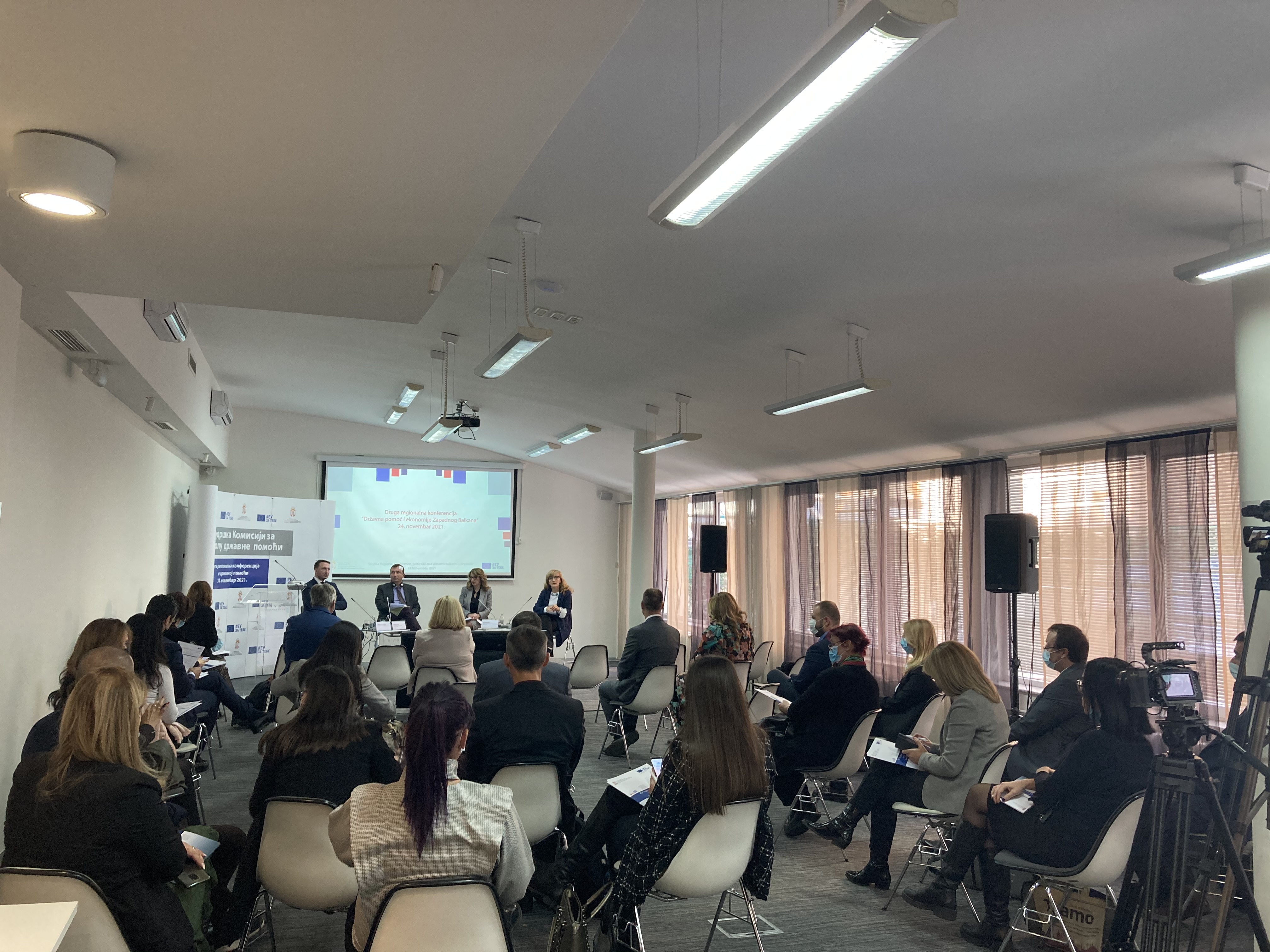Representatives of state aid control bodies from the Western Balkans region, the European Commission and European experts exchanged experiences on state aid granting during the current COVID-19 pandemic at the Second Regional Conference "State Aid and Western Balkans’ Economies" held in Belgrade and online on Wednesday, 24 November 2021
The conference "State aidd and Western Balkans' economies" was organised by the project Support to Commission for State Aid Control, which in the Republic of Serbia is financed by the European Union from IPA funds with almost EUR one million and is managed by the Ministry of Finance - Department for Contracting and Financing of European Union Funded Programmess.
Opening the conference, the Chairman of the Commission for State Aid Control Vladimir Antonijević said that in between two regional conferences the new Law on State Aid Control was entered into force in Serbia, the new Commission was formed and EU regulations were transposed into the national legislation. “We have closely followed European Commission practice regarding the COVID-19 pandemic. We have worked intensively in drafting the by-laws related to the pandemic and started harmonisation of EU temporary measures, being among the first states outside the EU that have adopted these measures”.
Antonijević said that in the process of the transposition of EU acquis into national legislation, more than 20 by-laws were adopted. The introduction of an electronic register of state aid is in the plan, he added. Antonijević expressed gratitude to the European Union on the support given through this project.
The Head of the Operations II of the Delegation of the European Union to the Republic of Serbia, Martin Klaucke said that state aid, as part of chapter 8 on Competition policy, proved to be one of the most difficult areas when it comes to alignment of the framework with the EU acquis and more importantly to effective enforcement. Klaucke invited all authorities across the region “to reap the benefits of this regional forum because exchange of experience and knowledge among peer institutions within the region has already proven to be very effective and relevant for all”. “We therefore hope to see this regional conference turn into tradition,”, Klaucke said.
Team leader of the project Support to the State Aid Control Commission, Radmila Mihić, pointed out that the public sector, due to the challenges the world is facing - COVID-19 pandemic, has a special weight in choosing policies and strategic goals. "Financial instability, the fight for a healthy environment, health care are just examples of areas in which public authorities must act. That action must be justified, effective and in the interest of the citizens. And that is why there are rules on state aid. Good state aid is an instrument to ensure the economic security of citizens and the development of society as a whole," Mihić said.
From Brussels, the representative of the General Directorate of the European Commission for Competition Policy, Alberto di Majo, also took part in the online meeting, presenting an overview of the latest developments in the European Union in the field of state aid. He reminded the words of the European Commissioner for Competition, Margrethe Vestager, that the European Recovery Plan includes a funding facility worth 672.5 billion euros in grants and loans, “which is a huge opportunity to drive forward the digital and green transitions”.
Professor of Kings College and College of Europe Andrea Biondi spoke about fiscal measures and state aid, while the representative of the Competition Council of the Republic of Lithuania Justina Paulauskaite shared the experience of granting state aid in that country during the COVID-19 pandemic. "The COVID-19 pandemic has shown that crises are difficult to predict, so it is important to strengthen the capacity of the public administration in the field of state aid to enable the process of distributing business support quickly, transparently and accurately," Paulauskaite said.
Representatives of the state aid control bodies in the Western Balkans exchanged experiences during the round table "Challenges for state aid institutions in the Western Balkans Six". Emir Đikić, Director of the CEFTA Secretariat also took part in the round table, pointing out that the competition and state aid are very relevant for all states involved in the 2020 initiative for the Common Regional Market.
This is the second regional conference on state aid, after the first one was held in Belgrade on September 26-27, 2019, also in the organisation of the project Support to Commission for State Aid Control. At the same time, the gatherring represents also the closing conference of that EU-funded project, which began in February 2019 and in 34 months of implementation contributed to the establishment of a new legal framework for state aid in Serbia, organised training sessions on EU state aid rules for more than 1,100 public sector employees and on-the-job trainings in 146 local self-government units. As Radmila Mihić presented, 14 workshops were held to disseminate basic knowledge and exchange experiences of EU member states on state aid. The State Aid Register has been prepared, as a database available to the competent institutions, members of the Commission for State Aid Control and its professional service have been trained to use the Instrument for Economic and Financial Analysis and the State Aid Calculator. Finally, two manuals on state aid rules have been prepared within the scope of project activities.




